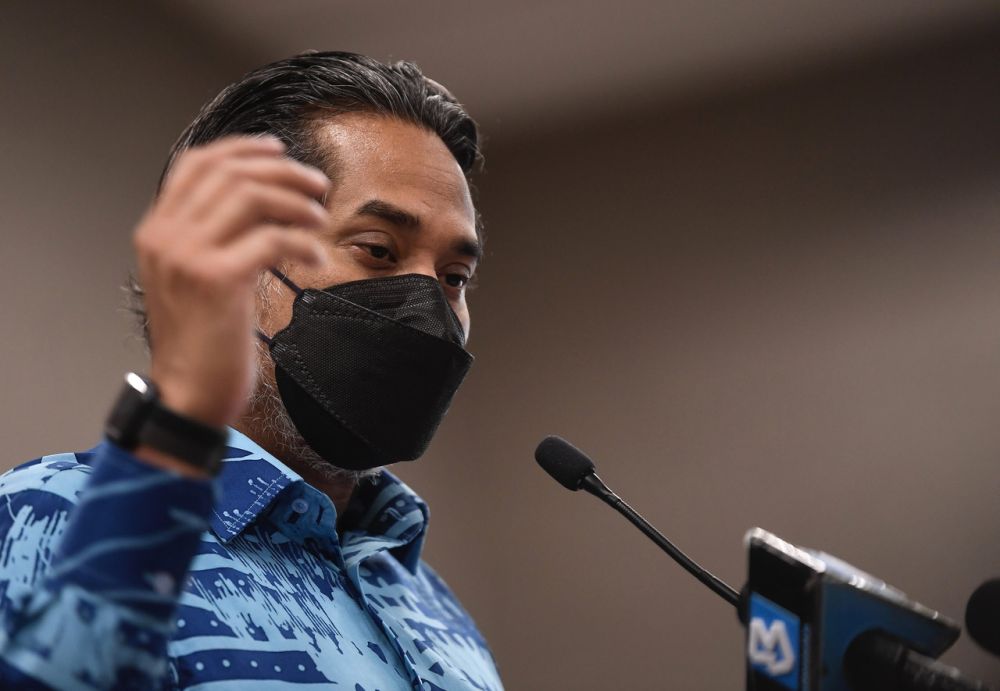Health Minister Khairy Jamaluddin speaks during a press conference at Parliament, Kuala Lumpur December 16, 2021. – Bernama pic
KUALA LUMPUR, Dec 16 — Health Minister Khairy Jamaluddin urged lawmakers again today to support the Bill to increase penalties available to health authorities under the Prevention and Control of Infectious Diseases Act 1988.
Lamenting the possibility of having to delay the Bill until March, Khairy claimed the Health Ministry needed the powers urgently to effectively combat the pandemic, especially now, with the threat of the more contagious Omicron Covid-19 variant looming.
Khairy said this was because it was only a matter of time before the Omicron wave hit the Malaysian public health system.
“If I am forced to withdraw the Bill… until March, we won’t have all the measures we need to face whatever it is that is going to happen.
“From other countries, they have informed us that ‘please brace yourselves for Omicron’. It’s coming, it is here already.
“It was just a matter of time. I have informed Tan Sri DG (Director-General of Health) Dr Noor Hisham Abdullah) and our front-liners that we have to be at our battle stations again. Even though our front liners are tired, I have to send them back to the battle stations because the wave is coming and I need this bill,” he said in a press conference today.
In the amendments to Act 342, the Health Ministry has proposed a maximum compound payment rate of RM500,000 for companies which is half of the initial RM1 million amount proposed in the Bill.
The ministry has not proposed lowering the maximum RM10,000 compound rate for individuals that were listed in the Bill.
As for the general penalty for offences committed under Act 342, the ministry has also proposed a maximum fine of RM50,000 and a maximum three years’ jail or both for individuals, which is about half of the Bill’s initial proposal of a maximum fine of RM100,000 and maximum seven years’ jail or both for individual offenders, among other amendments.
In today’s press conference, Khairy argued that the Bill was designed to appropriately penalise repeat offenders.
“The rationale (of the Bill) is more towards cases of repeat offenders and is geared towards certain cases. I gave an example, cluster Teratai. Cluster Teratai is a huge factory, where the revenue of the said company is in the billions annually.
“Before the Emergency Ordinance was enforced, we could only give fines of RM1,000. After the Emergency Ordinance (was gazetted), it had repeatedly become a cluster, and we fined them RM10,000.
“The condition of their employees is very deplorable in terms of their welfare and their living space. So this (amendment to Act 342) is geared towards such cases,” he said.
The Teratai cluster was announced on November 7, 2020, and officially ended on April 16, 2021, with a total case of 7,205 cases and one death.
In terms of individuals, Khairy also stressed that the higher penalties would act as a deterrent, especially for public figures.
“For individuals, we already have the guidelines. If you don’t wear a mask, we will advise you first. This is clear, I have even given an order, not to fine outright.
“But when there are repeat offenders, especially among public figures, we have to give something that acts as a deterrent to them but this is the last resort and I hope with the Omicron threat, I plead for all parliamentarians to help MOH by passing this amendment Bill,” he said.
Khairy then said that details of the Bill, such as fines and compound rates, will be discussed in the Dewan Rakyat’s special select committee on health, science and innovation.
“Next week I’ll sit down with the special select committee for health for us to discuss in detail on the guidelines and the rules.
“It is impossible for me to include all the finer details in the Act. I can’t include the fine for not wearing a face mask and so on.
“Because this is an Act regarding infectious diseases, all contagious diseases not just Coronavirus and maybe in the future, the needs will be different, the SOP will be different. We do not know what infectious diseases would be around next
“So we will try to future-proof the Act and I hope this Bill will be supported,” he said.

